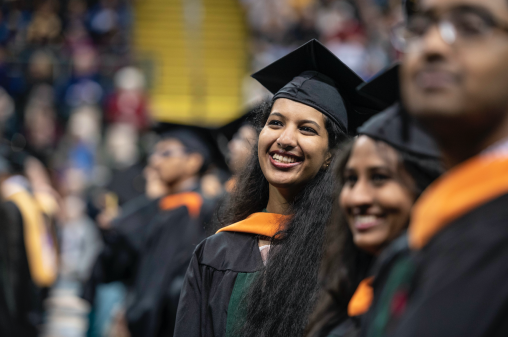
In 2022–23, the United States hosted 467,027 international graduate students, a year-over-year growth rate of 21.3 percent, with graduate learners making up 44 percent of all international students, according to 2023 data from Open Doors.
Across higher education, international students face unique challenges compared to their American peers and need additional supports to feel included and valued at their institutions.
Wright State University in Ohio hired six advanced-degree students to serve as ambassadors, assisting their international peers in getting comfortable at the institution and with graduate education in the U.S. at large.
What’s the need: While Wright State has offered resources for incoming undergraduate students from other nations in the past, the university has not provided the same kind of guidance to graduate students.
Nationally, graduate enrollment among domestic students has declined in recent years, requiring institutions to look toward international student enrollment to boost numbers. International students make up around half of Wright State’s 2,377 graduate students, explains Shu Schiller, interim dean of the college of graduate programs and honors studies.
The university conducted two graduate student surveys in fall 2023 to understand pain points in the student experience, one surveying currently enrolled students and another addressing students who stopped out. Students said financial needs, outside challenges and mental health struggles were among their top concerns.
The ambassador program grew out of conversations between Wright State leaders around how they could better support learners holistically, not just with academic achievement but also with personal goals and preparing for their lives beyond the institution.
How it works: The current cohort of ambassadors will serve graduate students in the College of Engineering and Computer Science, which is housed in the College of Graduate Programs and Honors Studies. Of Wright State’s international graduate students, over 80 percent are in a STEM degree program, and a majority of those students are enrolled in computer science or engineering.
Wright State’s six ambassadors are all international students themselves and high achievers in their programs.
The College of Engineering and Computer Science provided a space for student ambassadors to hold regular office hours during the week and key exam times. The office, located next to a study lounge in a lobby that’s frequently trafficked by students, will be stocked with snacks to attract learners, Schiller says.
Each ambassador will work a few hours per week, with a total of 20 hours across the cohort. Support will address academic concerns and wellness, as well as cultural transitions. The ambassadors will also be eyes and ears for administrators to learn more about the graduate student experience and where there needs to be additional institutional support.
The ambassadors received training from the student success team at Wright State, learning institutional policies and how to be a mandatory reporter, plus getting familiar with campus resources and how to address mental health concerns among their peers. Paula Bubulya, the associate dean of the College of Graduate Programs and Honors Studies, will supervise the student ambassadors.
The program is funded by the provost’s office, which provides scholarships for the ambassadors, furnishings for the office space and funds for future events and programs.
One of the first events will take place Jan. 31, an open house to introduce the ambassadors to their peers and provide a space for mingling. Other student-led workshops will cover professionalism in interviews, how to manage grant proposals, building a professional network and conquering capstone projects.
Looking ahead: Since launching the program this spring, other divisions at Wright State have expressed interest in creating their own ambassador programs. The College of Engineering and Computer Science’s ambassadors will serve as a pilot model before phase two begins later this year.
Schiller imagines future cohorts will involve different kinds of students, domestic and international, traditional and nontraditional, to best serve their peers.
View the original story at insidehighed.com
View the original Wright State Newsroom story at wright.edu/news

 Wright State to expand nursing facilities to meet workforce needs and prepare more graduates for in-demand careers
Wright State to expand nursing facilities to meet workforce needs and prepare more graduates for in-demand careers  Wright State student-athletes make a lasting impact on local family with more to come
Wright State student-athletes make a lasting impact on local family with more to come  Wright State names Rajneesh Suri dean of Raj Soin College of Business
Wright State names Rajneesh Suri dean of Raj Soin College of Business  ‘Only in New York,’ born at Wright State
‘Only in New York,’ born at Wright State  Wright State president, Horizon League leaders welcome new commissioner
Wright State president, Horizon League leaders welcome new commissioner 